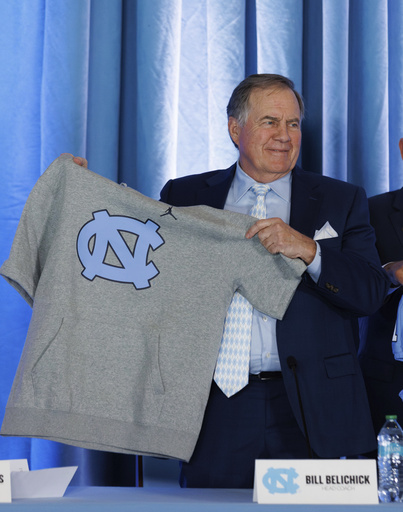
CHAPEL HILL, N.C. — Following his departure from the NFL, Bill Belichick engaged in discussions with college football coaches to share his insights on adapting professional strategies to collegiate football. Topics covered included the two-minute timeout, the transfer portal operating like free agency, NIL (name, image, likeness) collectives acting similarly to payrolls, and the impending introduction of revenue sharing within college athletics.
Belichick quickly began to visualize how a college program could be structured based on his extensive experience in the NFL. “I do think there are a lot of parallels,” he remarked. This outlook played a role in his decision to lead North Carolina’s football program. The landscape of college football has shifted significantly, necessitating increased professionalism as schools adapt their staffing to accommodate responsibilities that seemed more appropriate for a professional team.
North Carolina’s hiring of the 72-year-old Belichick signifies a bold move toward constructing what can essentially be seen as a mini-NFL front office. This shift could inspire other programs to follow suit. “I really think there are going to be some of those guys that may not have jobs in the NFL anymore,” noted Kansas State’s general manager, Clint Brown. “Now that this is going to be structured with a cap, that’s something they may find appealing.”
Rapid transformations in college sports, particularly regarding the ability of athletes to transfer without sitting out a year and profiting from NIL deals, mirror NFL dynamics. Recruiting strategies are now focused equally on acquiring experienced talent via the transfer portal and signing high school athletes, resembling the NFL’s approach to free agency and the draft.
A significant change is on the horizon with revenue sharing, derived from a $2.78 billion settlement related to antitrust litigation, which is expected to create a fund of about $21.5 million for athletes in its first year. Though specifics on fund distribution will be determined by individual schools, football’s prominence as a revenue source in college athletics will almost certainly ensure that it receives a substantial allocation, echoing a professional team’s salary cap model.
This evolving landscape prompts coaches to reevaluate their team structures. For example, Florida’s Billy Napier is interviewing candidates to fill a general manager role within the Gators’ organization. “We’re built to do it now,” Napier stated, emphasizing the transition into a business model with contracts, negotiations, and financial strategies. “It’s a major math puzzle that we’re getting ready to tackle.” He expressed excitement about the strategic planning to address these challenges.
Matt Rhule, who previously coached the NFL’s Carolina Panthers and now leads Nebraska, affirmed the complexities of head coaching at the collegiate level: “This job as a head coach is a juggernaut. There’s way more to do here than I had to do in the NFL.”
North Carolina’s decision to recruit Belichick reflects a calculated gamble amid the shifting dynamics of college football. “If I was 16 or 17 years old, a coach with that many Super Bowl victories coming to me and saying, ‘Come play for me’ would be hard to resist,” remarked Joshua Ezeudu, an offensive lineman for the New York Giants who previously played at UNC. “Especially if he’s going to offer you some financial incentives.”
The timing was fortuitous for UNC as Belichick sought opportunities following his NFL tenure. His conversations with various coaches from notable conferences helped him grasp how the evolving college environment resonated with his professional background. “College kind of came to me this year,” he explained. “I didn’t necessarily seek it out.”
The presence of Belichick in Chapel Hill is expected to boost visibility, with athletic director Bubba Cunningham indicating an increase in potential sponsorship and advertising revenues. Belichick’s plan includes hiring Michael Lombardi, a former NFL executive, to serve as the Tar Heels’ general manager. Additionally, his involvement in appearances on shows like the “Manningcast” during Monday Night Football provides further promotional opportunities for both himself and the program.
However, the financial implications of this shift are considerable. Belichick’s annual salary is set at $10 million, significantly more than previous coach Mack Brown’s compensation of approximately $4.2 million. The contract also allocates $10 million for assistant coaches and $5.3 million for support staff, showcasing a substantial increase from previous seasons under Brown.
UNC has invested heavily in football facilities, with over $40 million dedicated to enhancements, including an indoor practice facility and upgrades to the locker room and training areas. With these resources in place, it is now up to Belichick to adapt and refine the approach to football at North Carolina in alignment with current trends.
“We’re taking a risk,” Cunningham acknowledged. “We’re investing more in football with the hope and ambition that the return is going to significantly outweigh the investment.”
